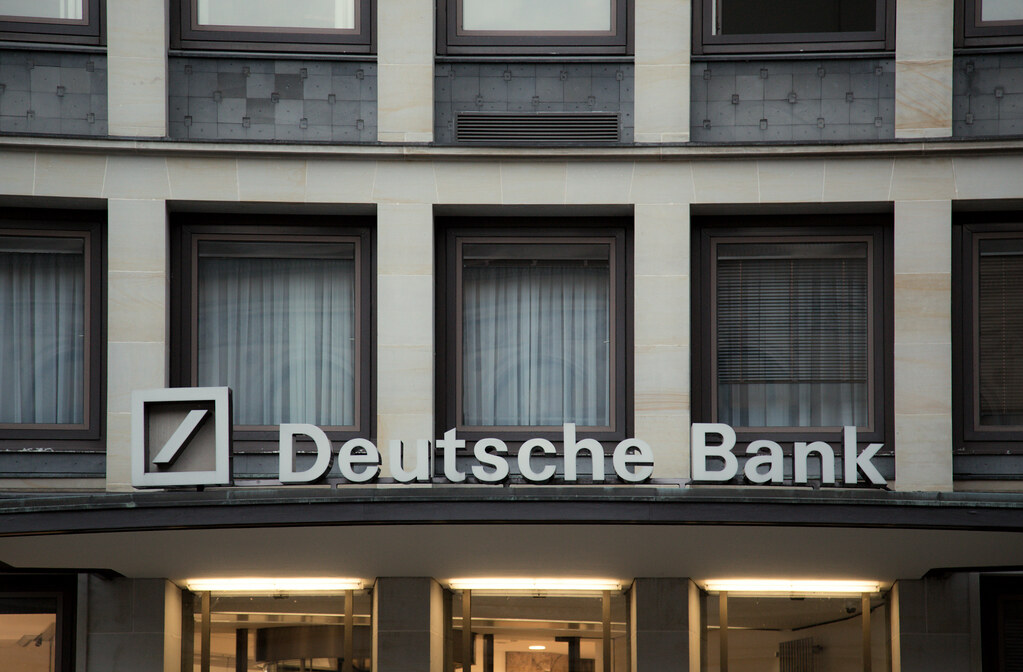WRAPUP 4-Deutsche Bank, UBS hit as bank fears spark stress signals
Shares in Germany's largest bank have lost a fifth of their value so far this month and the cost of its 5-year credit default swaps (CDS) - a form of insurance for bondholders - jumped to a four-year high on Friday, based on data from S&P Market Intelligence. "Deutsche Bank has been in the spotlight for a while now, in a similar way to how Credit Suisse had been," said Stuart Cole, head macro economist at Equiti Capital.

European banking stocks fell sharply on Friday, with Deutsche Bank and UBS knocked by worries that actions by regulators and central banks have not yet contained the worst problems to face the sector since the 2008 global financial crisis. Financial market stress indicators were also again flashing warning signs more widely, with the euro falling against the dollar and bond yields sinking.
Deutsche Bank shares fell for a third day, dropping more than 12% after a sharp jump in the cost of insuring its bonds against the risk of default. Shares in Germany's largest bank have lost a fifth of their value so far this month and the cost of its 5-year credit default swaps (CDS) - a form of insurance for bondholders - jumped to a four-year high on Friday, based on data from S&P Market Intelligence.
"Deutsche Bank has been in the spotlight for a while now, in a similar way to how Credit Suisse had been," said Stuart Cole, head macro economist at Equiti Capital. "It has gone through various restructurings and changes of leadership in attempts to get it back on a solid footing but so far none of these efforts appear to have really worked."
Deutsche Bank declined to comment. The pain was spread across the sector, with the index of top European banks falling 5.1% and British banks losing 4%, down for a third straight session.
"We are still on edge waiting for another domino to fall, and Deutsche is clearly the next one on everyone's minds (fairly or unfairly), said Chris Beauchamp, chief market analyst at IG. The fresh falls in Europe came as investors were looking to see how far U.S. authorities would go to shore up the banking sector, particularly fragile regional lenders.
U.S. Treasury Secretary Janet Yellen told lawmakers on Thursday that bank regulators and the Treasury were prepared to make comprehensive deposit guarantees at other banks, as they did at failed Silicon Valley Bank (SVB) and Signature Bank. Shares of major U.S. banks JPMorgan Chase & Co, Wells Fargo and Bank of America fell more than 2% in premarket trade on Friday.
Regional lenders, the focus of the strongest investor concerns, also declined, with First Republic Bank, PacWest Bancorp, Western Alliance Bancorp and Truist Financial Corp falling between 2% and 5%. "Underlying sentiment is still cautious and in this environment no one wants to go into the weekend risk-on," said Nordea chief analyst Jan von Gerich.
UBS CHALLENGES The global banking sector has been rocked since the sudden collapse this month of SVB and Signature Bank.
Policymakers have stressed the turmoil is different from the global financial crisis 15 years ago, saying banks are better capitalised and funds more easily available. But the worries spread quickly, and on Sunday UBS was rushed into taking over Swiss rival Credit Suisse after it lost the confidence of investors.
Swiss authorities and UBS are racing to close the takeover within as little as a month, according to two sources with knowledge of the plans. Separate sources told Reuters that UBS has promised retention packages to Credit Suisse wealth management staff in Asia to stem a talent exodus.
Brokerage group Jefferies cut its recommendation on UBS stock to "hold" from "buy", saying the acquisition of its former rival would change an equity story based on a lower risk profile, organic growth and high capital returns. "All these elements, which is what UBS shareholders bought into, are gone, likely for years," it said.
UBS shares were down 7% on Friday and its five-year CDS shot up 14 basis points. AT1 BONDS
The rescue of Credit Suisse has also ignited broader worries about investors' exposure to a fragile banking sector. The decision to prioritise shareholders over Additional Tier 1 (AT1) bondholders rattled the $275 billion AT1 bond market. These convertible bonds were designed to be invoked during rescues to prevent the costs of bailouts falling onto taxpayers.
As part of the deal with UBS, the Swiss regulator determined that Credit Suisse's AT1 bonds with a notional value of $17 billion would be wiped out, stunning global credit markets. European banks' AT1 debt came under fresh selling pressure on Friday, with Deutsche Bank and UBS AT1s down around four and two cents in price, respectively, according to Tradeweb data.
Standard Chartered Chief Executive Bill Winters said on Friday the wipeout of Credit Suisse bondholders had "profound" implications for global bank regulations. "I think it had very profound implications for the regulation of banks, and for the way that banks manage themselves," Winters told a financial forum in Hong Kong.
He also said the U.S. Federal Reserve's move to guarantee non-insured deposits was a "moral hazard". U.S. authorities had invoked "systemic risk exceptions" after the failures of SVB and Signature Bank that allowed them to protect uninsured deposits, including those of wealthy technology executives and cryptocurrency investors.
(This story has not been edited by Devdiscourse staff and is auto-generated from a syndicated feed.)
ALSO READ
Global Trade Tensions: Impact of U.S. Supreme Court's Tariff Ruling
U.S. Intelligence Aids in Taking Down Notorious Cartel Leader 'El Mencho'
Hong Kong's Subversion Sentences Spotlight Global Criticism
Hong Kong Stocks Surge Following U.S. Tariff Ruling
New Tariff Turmoil: U.S. Trade Policy Sparks Global Response










